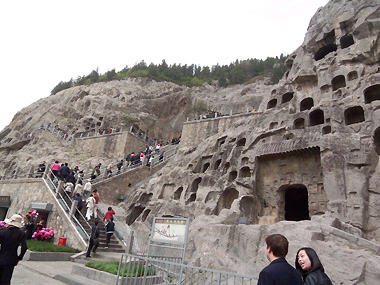Tracing the first empress in grottoes and peony gardens
|
|
|
Longmen Grottoes |
The city of Luoyang in Henan Province is famous for the Longmen Grottoes, its fabulous peony flowers and China's first and only empress, Wu Zetian (624-705 AD) in the Tang Dynasty (618-907 AD).
For many years Luoyang and Empress Wu were virtually synonymous, though many other important figures lived in the ancient city -- the capital of 15 dynasties. Some count 13 dynasties, some even say 31, depending on complicated definitions of Chinese dynasties.
I had heard many stories about the extraordinary and beautiful woman who rose to power and ruled from 690 to 705 AD.
On a short, two-day trip, I traced some of her history.
She was cultured, conniving, ruthless and ambitious in her drive to gain the throne. She also helped advance women, flying in the face of Confucian thought about the utterly subservient role of females. The sage is believed to have said that a woman ruler would be "as strange as a hen crowing at daybreak."
Wu lived in the prosperous Tang Dynasty and though the period was quite open, it was still a time when women were not even allowed to attend family ceremonies or visit temples.
Wu, born into a noble and cultured family, was at first a concubine of Emperor Taizong, founder of the Tang Dynasty, in his later years. Of course, a dead emperor's concubines were forbidden to marry. So Wu was sent to a nun's temple, like all the emperor's childless concubines.
However, Taizong's son, Gaozong, welcomed her back to the royal family as his concubine, and later wife. Historians recorded how the whole government and country were opposed to Gaozong's decision to make Wu his queen. But she triumphed over all criticism, arranged her own coronation and founded her own short-lived Zhou Dynasty (690-705 AD) after Gaozong died. She already has been the power behind the throne.
The Zhou Dynasty interrupted the Tang Dynasty. Its capital was Luoyang, while the Tang capital was today's Xi'an in Shaanxi Province. Some historians consider the Zhou Dynasty a branch of the Tang, while others consider it distinct.
In any case, Luoyang, one of the earliest ancient capitals, is sometimes considered one of the world's four most historic cities, together with Mecca (Saudi Arabia), Jerusalem (Israel) and Athens (Greece).
Luoyang is also known as the "City of Flowers" and is famous for its extraordinary peonies, notably in the Peony Park, and for the world-famous Longmen Grottoes.
Both are linked in the legend to Empress Wu.
It was difficult to decide where to go on a short trip, so we chose grottoes and gardens.
Longmen Grottoes
A Unesco World Heritage Site, Longmen Grottoes first caught my attention when I was a child and heard a fantastic tale about the empress, then powerful scheming consort.
This one is about how supremely confident Empress Wu left her deified image in Longmen Grottoes.
The empress was said to be devout Buddhist although modern historians and novelists consider her piety a political tool to rule the public.
While she was still imperial consort, she ordered the creation of many caves in the grottoes, including the Fengxian Temple Cave and the enormous statue of Vairocana Buddha -- not deep within but towering in a shallow niche on the mountain side.
It is the single largest statue among more than 100,000 in the grottoes. It stands more than 17 meters high and each ear is 1.9 meters long.
The statue is acknowledged as the most artistic and compelling and is said to be the likeness of Empress Wu herself. It is commanding, maternal and mysterious, exuding wisdom; the face almost bears a smile.
The tale that Wu ordered craftsmen to carve her image cannot be confirmed, but the strong motherly visage bears some resemblance to paintings of the empress in her later years. She abdicated in 705 AD and died the same year at the age of 80.
As consort, Wu attended the opening ceremony of the cave with hundreds of officials.
 0 Comments
0 Comments








Comments